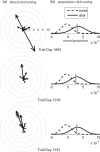Neural Point-and-Click Communication by a Person With Incomplete Locked-In Syndrome
- PMID: 25385765
- PMCID: PMC4426256
- DOI: 10.1177/1545968314554624
Neural Point-and-Click Communication by a Person With Incomplete Locked-In Syndrome
Abstract
A goal of brain-computer interface research is to develop fast and reliable means of communication for individuals with paralysis and anarthria. We evaluated the ability of an individual with incomplete locked-in syndrome enrolled in the BrainGate Neural Interface System pilot clinical trial to communicate using neural point-and-click control. A general-purpose interface was developed to provide control of a computer cursor in tandem with one of two on-screen virtual keyboards. The novel BrainGate Radial Keyboard was compared to a standard QWERTY keyboard in a balanced copy-spelling task. The Radial Keyboard yielded a significant improvement in typing accuracy and speed-enabling typing rates over 10 correct characters per minute. The participant used this interface to communicate face-to-face with research staff by using text-to-speech conversion, and remotely using an internet chat application. This study demonstrates the first use of an intracortical brain-computer interface for neural point-and-click communication by an individual with incomplete locked-in syndrome.
Keywords: ALS; assistive technology; paralysis; spinal cord injury; stroke; text entry.
© The Author(s) 2014.
Figures





Comment in
-
Neural repair and rehabilitation: Implant helps patient with incomplete locked-in syndrome.Nat Rev Neurol. 2015 Jan;11(1):2. doi: 10.1038/nrneurol.2014.230. Epub 2014 Nov 25. Nat Rev Neurol. 2015. PMID: 25421909 No abstract available.
References
-
- Birbaumer N, Ghanayim N, Hinterberger T, et al. A spelling device for the paralysed. Nature. 1999;398:297–298. doi:10.1038/18581. - PubMed
-
- Wolpaw JR, Birbaumer N, McFarland DJ, Pfurtscheller G, Vaughan TM. Brain-computer interfaces for communication and control. Clin Neurophysiol. 2002;113:767–91. doi:10.1016/S1388-2457(02)00057-3. - PubMed
-
- Farwell LA, Donchin E. Talking off the top of your head: toward a mental prosthesis utilizing event-related brain potentials. Electroencephalogr Clin Neurophysiol. 1988;70:510–523. doi:10.1016/0013-4694(88)90149-6. - PubMed
-
- Guger C, Daban S, Sellers E, et al. How many people are able to control a P300-based brain-computer interface (BCI)? Neurosci Lett. 2009;462:94–98. doi:10.1016/j.neulet.2009.06.045. - PubMed
Publication types
MeSH terms
Grants and funding
LinkOut - more resources
Full Text Sources
Other Literature Sources
Medical
Miscellaneous

